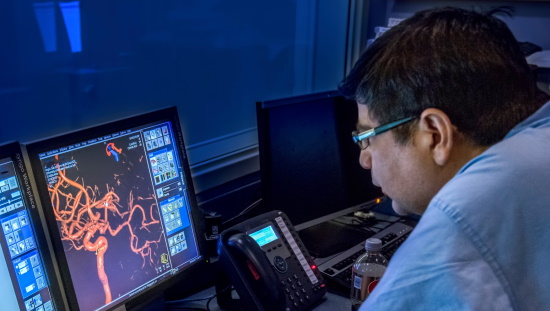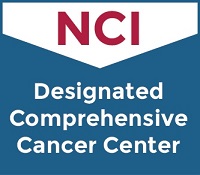Glioblastoma

Primary brain tumors begin in the brain tissue and can be noncancerous or cancerous. Glioblastoma, also called glioblastoma multiforme or GBM, is the most common – and most aggressive – cancerous primary brain tumor in adults.
Glioma and Glioblastoma
Glioblastomas are a type of glioma, a category of tumors. The name comes from "glia," meaning glue. Glial cells support and sustain the brain's neurons, or nerve cells. Glioblastoma, sometimes called astrocytoma, affects astrocytes, a type of star-shaped glial cell.
Glioblastomas can develop anywhere in the brain but don't normally spread outside the brain. What makes glioblastoma so difficult to treat is that cancer cells move along neural pathways forming tentacles or threads that spread to other parts of the brain. This makes it impossible to remove all cancer cells by surgery.
Glioblastoma Causes and Risk Factors
Although we don't know the exact causes of glioblastoma, we know it is more common in men than in women. White populations had the highest incidence rates, with North American Blacks following, and populations of eastern and southeastern Asian origin had the lowest rates. The average of diagnosis is 64.
Other risk factors include:
- Impaired immune system
- Hereditary genetic conditions like Li-Fraumeni and Lynch syndromes
- Radiation therapy to the central nervous system or head
Glioblastoma Symptoms
Glioblastoma usually affects active, healthy people. Symptoms may include:
- Changes in mental abilities
- Changes in mood and personality
- Double or blurred vision
- Loss of appetite
- Seizures
- Speech difficulty
- Persistent headaches
- Vomiting
Glioblastomas can sometimes grow for nearly a year before symptoms suddenly appear. Some patients may experience gradual changes, such as problems with language, concentration, or coordination and strength on one side of the body.
Glioblastoma Diagnosis
To diagnose glioblastoma you may have procedures such as:
Glioblastoma Treatment
Because glioblastomas grow rapidly, treatment should begin as soon as possible after diagnosis. The primary treatment for glioblastoma is surgery to remove as much of the tumor as safely as possible, combined with radiation and chemotherapy.
Treatments for glioblastoma and other gliomas include:
- Focused ultrasound (FUS)– Sound waves temporarily disrupt the blood-brain barrier in the area surrounding the tumor, enabling medicine to travel through and kill invading cancer cells.
- Gamma knife radiosurgery – Also called stereotactic radiosurgery, this noninvasive treatment uses a highly focused beam radiation that treats the tumor but avoids healthy tissue.
- Proton beam radiation - Also known as proton therapy, proton beam radiation is a highly advanced form of radiation therapy which uses protons instead of x-rays, as with traditional radiation. Performed on an outpatient basis over the course of a few weeks, proton therapy is a well-tolerated, painless, and non-invasive treatment that can reduce side effects.
- Tumor treating fields (TTF) – FDA-approved for glioblastoma in 2015, TTF treats brain tumors with alternating electrical currents. You wear a head-covering device that looks like a bathing cap containing hundreds of small electrodes. The cap generates low-power, electric fields that switch from positive to negative up to 300,000 times a second. This interrupts the cell-growth process of cancer cells without affecting healthy brain cells.
Clinical Trials
Cancer specialists at University of Maryland Medical Marlene and Stewart Greenbaum Cancer Center not only treat patients but are also at the forefront of cancer research. As a patient, you may be eligible to take part in a clinical trial for glioblastoma. You'll receive the latest therapies not available elsewhere while helping advance scientific knowledge in the search for cure for cancer.
Learn more about brain tumor clinical trials at UMGCCC.
Clinical TrialsMake an Appointment
Make an appointment or learn more about advanced treatment for glioblastoma for yourself or a loved one. Call 410-328-6034.


